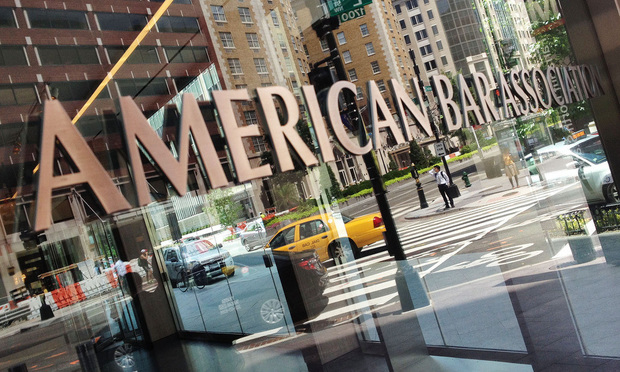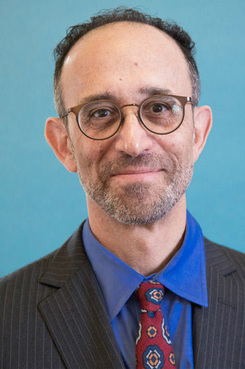ABA Clarifies Rules on Lawyer Advertising (Sort Of)
At the ABA's recent national convention, a board of delegates voted to adopt a set of changes to model rules surrounding attorney advertising, a confusing ethical area for both Big and Small Law.
August 09, 2018 at 04:45 PM
8 minute read

Changes that the American Bar Association adopted earlier this week to its model rules regarding attorney advertising and business solicitation mark a significant step toward clarifying what has been a confusing area of legal ethics, said several lawyers who focus on professional liability issues.
But the new rules also stop short of addressing murky questions about attorney referrals that have arisen in the age of social media platforms, such as LinkedIn, and lawyer review websites, such as Avvo Inc., those lawyers added. And the practical impact of the updates will likely depend on whether and how quickly state bar associations follow the ABA's guidance.
The ABA House of Delegates—a body of 601 members comprised of state, local and other bar associations and legal groups—voted Monday to adopt proposed changes to its model rules of professional responsibility that supporters believe will streamline a complex set of regulations surrounding lawyer advertisements.
The advertising updates were part of a larger set of proposals up for consideration during the tail end of the ABA's recent annual meeting in Chicago. The changes focused on model Rules 7.1 through 7.5, parts of which have now been simplified and condensed, the ABA said. Ahead of the delegates' vote on the proposed changes, Lucian Pera, a litigation and dispute resolution partner at Adams & Reese in Memphis, who serves as governing council chair of the ABA's professional responsibility section, explained the proposal.
 Lucian Pera
Lucian Pera“They will focus enforcement on false and misleading ads,” said Pera, according to a video of the ABA meeting. “And they will make it easier for lawyers to more effectively communicate to potential users of legal services how lawyers can identify and solve their legal problems—we call that access to justice. And many lawyers—especially younger lawyers—have argued to the committee that many current ad rules also hinder them from being innovative and from making a living.”
Specifically, the updates would combine provisions concerning misleading statements into a single section of the model ethics rules and would provide further guidance on what lawyers might be restricted from saying in an advertisement or other communication, according to the ABA. The proposed update would specify, for instance, that communications about a lawyer's fee must also include information about whatever costs a client may have to pay, something that could affect lawyers who plan to offer a partial contingency fee structure that might result in a client paying some court costs.
Separately, the ABA tweaked the model rules related to referral payments, in which someone is paid for recommending a lawyer to a prospective client. Those payments are generally prohibited under the ABA model rules, with some key exceptions. The proposed update wouldn't substantively change the referral rules, but would create a new exception that allows for nominal “thank you” gifts “that are neither intended nor reasonably expected to be a form of compensation for recommending a lawyer's services.”
Coming out of the ABA annual meeting, the Association of Professional Responsibility Lawyers (APRL), a Chicago-based group made up of more than 450 lawyers, law professors and judges, hailed the changes to the model rules.
“The first practical issue with the advertising rules is that they're just chaotic. Every state has different regulations, and they change and nobody really knows what they mean,” said Holland & Knight partner Allison Martin Rhodes, president of APRL. “Because the legal profession is much more of a national, if not global, enterprise, some simplicity in regulation was necessary.”
 Allison Martin Rhodes
Allison Martin RhodesMartin Rhodes, co-chair of Holland & Knight's legal profession team, explained that the process for updating the ABA's model rules in this area started a few years ago, with APRL playing a large role. The group penned a 2015 report on potential rule revisions, based on survey results and other input from the many state regulators in charge of enforcing legal ethics rules.
Generally, Martin Rhodes said, APRL learned through the process that the advertising rules weren't being enforced in a standard way across different state bars, if they were being enforced at all. The group also learned that, in a majority of cases, complaints to state bars alleging improper advertising were often coming from lawyers, as opposed to consumers of legal services. That second finding, in particular, was problematic because the advertising and solicitation rules were designed to protect clients from misleading claims by lawyers, not to provide a forum for disputes between lawyers competing against one another for business.
But Martin Rhodes said she believes the recently-approved ABA rule changes will help address the issue and return the focus to clients instead of competing lawyers.
“It will improve the regulator's ability to have a sensible enforcement protocol,” said Martin Rhodes, who works out of Los Angeles and Portland, Oregon. “Client protection is our goal.”
Martin Rhodes also noted another change in the model rules dealing with the in-person solicitation of clients. The ethics rules in that area have generally sought to tamp down on “ambulance chasing,” where a lawyer approaches an unsophisticated consumer who may have just suffered an injury and tries to sign them up as a client.
Under the revised rules, the ABA now makes clear that those prohibitions on in-person solicitation don't apply in the same way to “sophisticated consumers of legal services, such as in-house counsel, risk managers and insurance adjusters,” said Barry Temkin, a litigation partner at Mound Cotton Wollan & Greengrass who's also a member and past chairman of the New York County Lawyers Association Committee on Professional Ethics. That shift, Temkin added, aligns with common sense and the modern-day realities of maintaining a legal practice.
 Barry Temkin
Barry Temkin“This rule would simply reflect the reality on the ground in most jurisdictions,” he said. “After all, the solicitation rules were designed to prevent ambulance chasing of unsophisticated lay persons, and shouldn't be applied to, for example, solicitation of corporate executives on the golf course, who presumably have the business acumen to negotiate with counsel and deflect hard-sell tactics.”
While Temkin, Martin Rhodes and others said they believe the ABA updates will provide some much needed clarity and simplification of the rules, they both pointed to an emerging area in the legal profession that the ABA's ethics rules don't really address—namely, how the advertising and referral fee rules apply to social media networks or online lawyer review and referral services like Avvo, which in July said it would discontinue its own legal services offering.
As one example, Temkin said the new ABA rules don't directly answer whether a lawyer who promotes himself or herself on LinkedIn is engaging in attorney advertising that needs to be labeled that way.
“If a LinkedIn contact recommends a lawyer for a skill she manifestly doesn't possess, is that misleading advertising by the recommended lawyer?” said Temkin, giving another specific example of the kinds of questions still left unanswered. “The new ABA rules don't help resolve this issue.”
Martin Rhodes said grappling with the kinds of issues that Temkin raised is likely the next frontier for another round of updates to the advertising and solicitation pieces of the ethics rules. In fact, she said, the future of the legal profession is the subject of APRL's next regular meeting, and she expects issues surrounding technology and fees to be at the center of the discussion.
“There are still restraints on what fundamentally is the Avvo model,” Martin Rhodes said. “The debate that will continue to rage on will be the extent to which those businesses can receive remuneration … in a way that's tied to whether a lawyer actually receives a referral.”
Another open question is how the ABA's model rule changes will trickle down to state bars, which actually enforce ethics rules. The states aren't bound by the ABA's model rules, but often use them as a guide for updating or creating their own state bar attorney licensing and disciplinary regulations.
Martin Rhodes said it's likely the adoption by state bars will take some time, and probably not all states will ultimately enact changes in line with the ABA's guidance. Nonetheless, she noted that Oregon, Washington and Virginia have already adopted advertising and solicitation rules that do align with the ABA model, and she expects a number of states to follow suit within the next couple of years.
“I think you're going to find widespread support,” Martin Rhodes said about the ABA model rule changes. Still, she added, “It'll be a process in each state.”
This content has been archived. It is available through our partners, LexisNexis® and Bloomberg Law.
To view this content, please continue to their sites.
Not a Lexis Subscriber?
Subscribe Now
Not a Bloomberg Law Subscriber?
Subscribe Now
NOT FOR REPRINT
© 2025 ALM Global, LLC, All Rights Reserved. Request academic re-use from www.copyright.com. All other uses, submit a request to [email protected]. For more information visit Asset & Logo Licensing.
You Might Like
View All
Will a Market Dominated by Small- to Mid-Cap Deals Give Rise to a Dark Horse US Firm in China?


'Ridiculously Busy': Several Law Firms Position Themselves as Go-To Experts on Trump’s Executive Orders
5 minute read
The Law Firm Disrupted: For Office Policies, Big Law Has Its Ear to the Market, Not to Trump
Trending Stories
- 1New York-Based Skadden Team Joins White & Case Group in Mexico City for Citigroup Demerger
- 2No Two Wildfires Alike: Lawyers Take Different Legal Strategies in California
- 3Poop-Themed Dog Toy OK as Parody, but Still Tarnished Jack Daniel’s Brand, Court Says
- 4Meet the New President of NY's Association of Trial Court Jurists
- 5Lawyers' Phones Are Ringing: What Should Employers Do If ICE Raids Their Business?
Who Got The Work
J. Brugh Lower of Gibbons has entered an appearance for industrial equipment supplier Devco Corporation in a pending trademark infringement lawsuit. The suit, accusing the defendant of selling knock-off Graco products, was filed Dec. 18 in New Jersey District Court by Rivkin Radler on behalf of Graco Inc. and Graco Minnesota. The case, assigned to U.S. District Judge Zahid N. Quraishi, is 3:24-cv-11294, Graco Inc. et al v. Devco Corporation.
Who Got The Work
Rebecca Maller-Stein and Kent A. Yalowitz of Arnold & Porter Kaye Scholer have entered their appearances for Hanaco Venture Capital and its executives, Lior Prosor and David Frankel, in a pending securities lawsuit. The action, filed on Dec. 24 in New York Southern District Court by Zell, Aron & Co. on behalf of Goldeneye Advisors, accuses the defendants of negligently and fraudulently managing the plaintiff's $1 million investment. The case, assigned to U.S. District Judge Vernon S. Broderick, is 1:24-cv-09918, Goldeneye Advisors, LLC v. Hanaco Venture Capital, Ltd. et al.
Who Got The Work
Attorneys from A&O Shearman has stepped in as defense counsel for Toronto-Dominion Bank and other defendants in a pending securities class action. The suit, filed Dec. 11 in New York Southern District Court by Bleichmar Fonti & Auld, accuses the defendants of concealing the bank's 'pervasive' deficiencies in regards to its compliance with the Bank Secrecy Act and the quality of its anti-money laundering controls. The case, assigned to U.S. District Judge Arun Subramanian, is 1:24-cv-09445, Gonzalez v. The Toronto-Dominion Bank et al.
Who Got The Work
Crown Castle International, a Pennsylvania company providing shared communications infrastructure, has turned to Luke D. Wolf of Gordon Rees Scully Mansukhani to fend off a pending breach-of-contract lawsuit. The court action, filed Nov. 25 in Michigan Eastern District Court by Hooper Hathaway PC on behalf of The Town Residences LLC, accuses Crown Castle of failing to transfer approximately $30,000 in utility payments from T-Mobile in breach of a roof-top lease and assignment agreement. The case, assigned to U.S. District Judge Susan K. Declercq, is 2:24-cv-13131, The Town Residences LLC v. T-Mobile US, Inc. et al.
Who Got The Work
Wilfred P. Coronato and Daniel M. Schwartz of McCarter & English have stepped in as defense counsel to Electrolux Home Products Inc. in a pending product liability lawsuit. The court action, filed Nov. 26 in New York Eastern District Court by Poulos Lopiccolo PC and Nagel Rice LLP on behalf of David Stern, alleges that the defendant's refrigerators’ drawers and shelving repeatedly break and fall apart within months after purchase. The case, assigned to U.S. District Judge Joan M. Azrack, is 2:24-cv-08204, Stern v. Electrolux Home Products, Inc.
Featured Firms
Law Offices of Gary Martin Hays & Associates, P.C.
(470) 294-1674
Law Offices of Mark E. Salomone
(857) 444-6468
Smith & Hassler
(713) 739-1250










